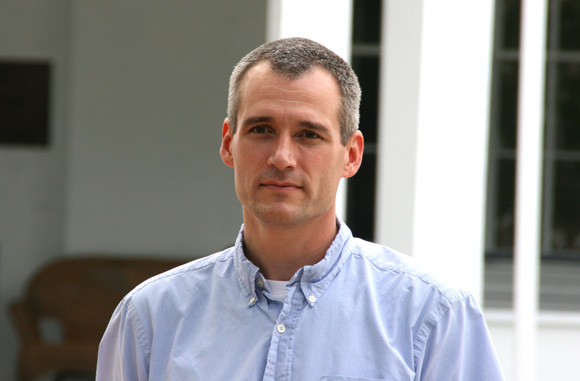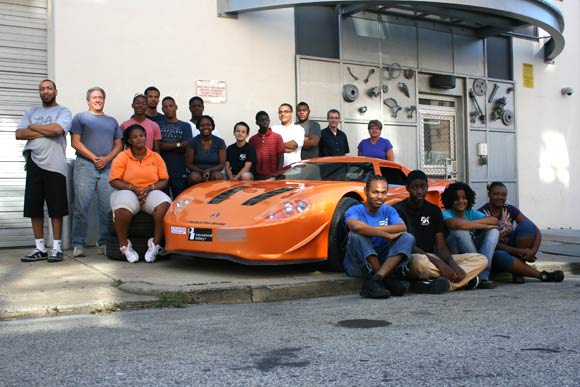The Sustainability Workshop doesn't feel like a school — at least not the classic American archetype of lockers, long hallways, blackboards and rows of front-facing desks. If anything, this beautiful, light-filled, white mansion at the Navy Yard that now hosts 29 Philadelphia public school seniors feels more like an internet start-up: large tables that encourage collaboration, young men and women hunched over laptops, the quiet murmur of respectful conversation.
The program is the brainchild of Simon Hauger, Michael Clapper, C. Aiden Downey and Matthew Riggan, former co-workers at West Philadelphia High School. Through an after-school program there, Hauger launched the EVX Team, a group of students building hybrid cars for competition. The team has had tremendous success — their projects outpacing rivals from international companies and top universities. Through his experience with EVX, Hauger and his team saw the value of project-based education. They developed a vision for a school based on this concept with a special focus on sustainability.
“We've been having dinner together and dreaming — or scheming — about how to get a school off the ground for the past 14, 15 years,” says Clapper. “Simon, of course, had continued that awesome trajectory with the EVX team. The question became, how do we take that work that's occurring after school — the engagement the kids have, the interest they have — and build a school from that foundation? How do we take what happens between 3 p.m. and 5 p.m. and make it into an entire school day?”
First, they needed a building. A relationship with the Greater Philadelphia Innovation Cluster (GPIC) helped lure them to the Navy Yard. Numerous partnership opportunities would be at their fingertips, and Philadelphia Industrial Development Corporation (PIDC) ended up offering a deal on the space. “The building is great,” says Hauger. “Not just because we love it, but because of the message it sends to the kids. It doesn't feel like school.”
After securing private funding, mostly through the Barra Foundation, they needed students. The district welcomed Hauger and Clapper into Furness High School and South Philadelphia High School to recruit (students remain technically enrolled at their former schools). Four kids from West Philadelphia High School also volunteered. They took all the students who applied, and ended up with a self-selected group of motivated students.
“At a comprehensive high school in Philadelphia, if the class started with 300, there are only 100 left,” explains Clapper. “So, you've got some survivors, some really resilient and thoughtful kids. I think the kids thought this was a chance to do a different kind of high school.”
School days are flexible, but always feature project time and skills labs. Three times a week, guest speakers give presentations — they've already hosted a Princeton plasma physicist, a city councilman, the district attorney, a professional musician and an architect working on green construction. The success of the Workshop will depend on integrating traditional coursework — math, science, English, social studies — into a series of projects.
The Navy Yard has already been a huge asset. Through GPIC, five students helped install a solar rig, and the entire school community attended its activation. Other tenants have also been encouraging, whether they're talking commercial branding or energy efficiency. “We went to Urban Outfitters one day,” recalls Clapper with a smile. “Our tour guide asked the kids, 'Who is the 'Anthropologie woman?' Then the next day we're at the Navy hearing about their power cell approach. We walk in and they say, 'We're so looking forward to interfacing with you today.' “
Who Am I?
On a Tuesday in mid-September, students are putting finishing touches on their first major project of the year: “Who Am I?” Using Chrome-books (Google laptops designed for web surfing and cloud computing), they are designing PowerPoint presentations detailing their story so far and goals for the future.
The first student to present is (the very brave) Richard Taylor, a soft-spoken young man who talked about his early struggles with stuttering, childhood moves from Tennessee to Cleveland to Philadelphia, and his passion for robotics. “When I was in Tennessee, I wasn't speaking well,” he says, nerves sneaking into his voice. “I had a lot of stuttering problems. I had to go to speech therapy class, which helped me speak more articulately and improve my vocabulary.”
At the end of his presentation, Clapper opens the floor to comments and questions. Hands shoot up, and students offer well-considered feedback — complimenting achievements and pointing out areas that need improvement. The atmosphere is casual: when someone asks if Taylor ever met LeBron James, the room erupts in laughter. In five minutes, his classmates learn more about Taylor than many would learn in an entire year.
The ethnic and cultural diversity at the Sustainability Workshop is truly remarkable, reflecting, in particular, the changing demographics of South Philadelphia. Another presenter, Jocamari Nunez, spent three years in Peru with her family. Yet another, Sachin Patel was prepping a presentation that focused on his struggles to learn English and his desire to study computer science.
Kevin Ho, a stoic young man with a wily sense of humor, lived the first 14 years of his life in Paris, France. He opened his project by proclaiming, “I don't like to talk about myself, or my past. I want to focus on my future.” Ironically, every goal he listed was informed by details from his early life. He talked about growing up with a Vietnamese father and a French mother, and how he would like to travel to Asia. “Even though I've never been to Asia, I feel extremely homesick,” he said. “Isn't that weird? Maybe I am just curious to discover my Asian roots. But I also consider myself white, so I would be discovering my own country as a stranger.”
Hearing frank, emotionally-astute testimonies from high school seniors was poignant, and surprising. Many of the presenters expressed ambiguous feelings about their families: appreciation, respect, disappointment, even anger. “I love them very much, but sometimes they give me a hard time,” said Hien Tuan Rom, who credited his uncle (and martial arts) for helping him with anger management. “They've shown me how to become a good person, and how to be a bad person — and I'm kind of stuck in the middle.”
“I don't want to force my parents to be proud of me,” explained Ho. “I just want to be someone they admire. I want them to look at me as an individual.”
The “Who Am I?” lesson, which included writing and project design skills, is really about creating a personal narrative. It's an invaluable skill, whether a young person is attending a job interview, making friends or pitching an idea in the workplace.
A School Apart
“When you trust kids, they rarely let you down,” says Clapper. At the Sustainability Workshop, a lot of responsibility falls on the students. They have to manage their own time to meet deadlines and are often asked to organize themselves into teams and workgroups. Sometimes that trust comes down to the small things: healthy snacks are on-hand all day and they can eat whenever they want. “We're trying to remove the teacher-student confrontational dynamic a normal school sets up,” adds Hauger. “Challenges pop up, and we're going to have to figure out how to solve these things together.”
For the students, it's that freedom that really sets the Workshop apart from a traditional school experience. Lou Collazzo came from Furness High School. “I felt that this would be better for me,” he says. “It's more one-on-one stuff, as opposed to one teacher teaching 30 kids. You know everyone here, so you're like a family. It's a lot less stress. You can actually be comfortable and learn — and you don't even realize you're learning the whole time.”
“I really love the freedom they give us, because we're getting used to what college is going to be like,” says Alejandra Melean, who moved to Philadelphia from Venezuela seven years ago speaking no English. “Eventually we're not going to have anyone behind us. My mom was the one who persuaded me to come. I'm really glad she pushed me.”
Not all parents were so easily convinced: “When (my mom)came here, she was like, 'Where's the school?' ” recalls Kimberly Keyes. “I said, this is the school. At first, she didn't think she would like it, but I come home and I'm happy and I have so much to say about my day. If I was at my old school, I'd probably be coming home mad and not wanting to talk to anybody.”
So, yes, in some ways the Sustainability Workshop doesn't feel like a school, and maybe that's a good thing. This is a space for brainstorming, long-term projects, creativity and self-starters. It's cultivating students that will already know how to navigate adult environments by asking serious questions, listening to their peers and taking pride in what they produce.
“I hate to speak in cliches,” says Clapper, “but it's about the light that comes into their eyes — the super-engagement you have when you're working on something you care about.”
Of course, he has it too.
LEE STABERT is a freelance writer living in Philadelphia. Send feedback here.
Photos
Simon Hauger
Hauger and his teams that started the project-based learning movement



